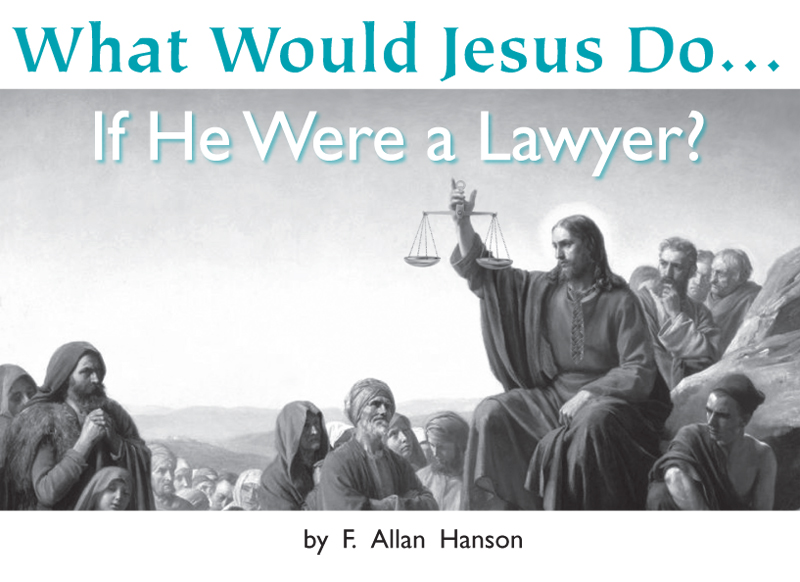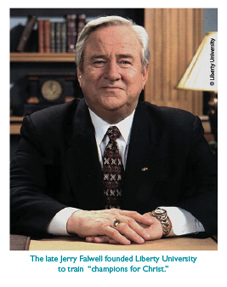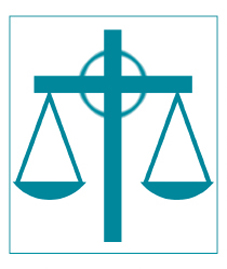What Would Jesus Do…If He Were a Lawyer?

Published in the Humanist, November/December 2008
Bruce Green was excited and daunted by the task that lay before him. It was August 2003, and he had been named dean of a new law school that would open its doors to the inaugural class of students in just one year. In the coming twelve months he would have to hire faculty and staff; oversee the construction of the law library, classrooms, and offices; travel to undergraduate campuses to spread the word and recruit students; manage the review of applications; and, most important of all, ponder and promote the unique mission of his school.
 This would be no ordinary law school but rather part of Liberty University, an institution founded in 1971 in Lynchburg, Virginia, by the late Jerry Falwell expressly to infuse higher education with the message of Christianity. In line with his strategy of “saturation evangelism” (“using every available means to reach every available person at every available time”), Falwell’s plan for the law school was to train “champions for Christ” who would be on the Judeo-Christian side of every issue. Falwell spoke of godly men and women permeating all levels of the legal profession.
This would be no ordinary law school but rather part of Liberty University, an institution founded in 1971 in Lynchburg, Virginia, by the late Jerry Falwell expressly to infuse higher education with the message of Christianity. In line with his strategy of “saturation evangelism” (“using every available means to reach every available person at every available time”), Falwell’s plan for the law school was to train “champions for Christ” who would be on the Judeo-Christian side of every issue. Falwell spoke of godly men and women permeating all levels of the legal profession.
While many universities with sectarian ties have law schools (Notre Dame, Baylor, Brigham Young, and Yeshiva, to name just a few), the legal education most of them offer is barely distinguishable from that in nonsectarian schools. However, in addition to Liberty, Christianity deeply and expressly infuses legal education in at least four other American law schools. Thomas Goode Jones School of Law, now associated with Faulkner University in Montgomery, Alabama, has existed since 1928 but received provisional accreditation from the American Bar Association only in 2006. Regent University School of Law, in Virginia Beach, Virginia, which began in 1979 as part of Tulsa’s Oral Roberts University and moved to Virginia Beach in 1986, is part of the university headed by evangelist Pat Robertson. Two Roman Catholic law schools, Ave Maria in Ann Arbor, Michigan, and St. Thomas in Minneapolis, Minnesota, opened in 2000 and 2001, respectively.
Reflecting on the opening of Liberty law school, Rev. Barry W. Lynn, executive director of Americans United for Separation of Church and State, warned the school was preparing students “for a religious takeover of the government.” With its first class graduating in 2007, it’s too soon to evaluate Lynn’s charge. But the more established Regent University, whose motto is “Christian leadership to change the world,” counts John Ashcroft among its law faculty, and at one time boasted that they had placed over 150 graduates in the Bush administration. (This claim was removed from the school’s website in the wake of last year’s Justice Department firing scandal. Monica Goodling, a 1999 Regent law school graduate who became senior counsel to Attorney General Alberto Gonzales and Justice Department liaison to the White House, resigned over her role in the firings of several U.S. Attorneys for apparently partisan reasons.) The recent influence of these schools and their graduates, far out of proportion to their numbers, recommends a closer look at their concept of the law and its place in society.
In the year prior to the opening of Liberty law school, Dean Green recorded the steps toward its realization and his thoughts and hopes in an almost daily blog (archived on the school’s website but removed sometime in 2006). On July 9, 2004, Green reflected on how people think. “A plausibility structure,” he wrote, “is an intellectual grid (his emphasis) through which reality is determined. . . . Ideas consistent with a person’s plausibility structure are immediately believed and things that contradict it are simply not.” No less than anyone else, Green and other conservative Christian academic lawyers have a certain plausibility structure, or, to use another word for it, worldview. And, like everyone else, it conditions what they do and do not believe. What needs to be understood is how radically it varies from the worldview of other lawyers and people in general who don’t subscribe to a fundamentalist version of Christianity.
Consider, by contrast, a passage written by attorney James M. Hirschhorn in the May 24, 2004, issue of the New Jersey Law Journal. He was responding to the Archbishop of Newark, the Rev. John J. Myers, who criticized Seton Hall law school for honoring Supreme Court Justice Sandra Day O’Connor and Judge Maryanne Trump Barry, both of whom had ruled in favor of abortion rights. Hirschhorn wrote that the American legal system
recognizes that self-evident moral truths are few and far between, that rational disagreement is the foundation of progress, that one’s adversary is generally an honorable person who may sometimes be right, and that liberty requires a mutual willingness to mind one’s own business . . . leaving faith to the realm of private conscience, private persuasion and private conduct. The craving for indisputable orthodoxy in any form is its enemy. . . .[A lawyer’s] principal function is not to rid the world of someone’s idea of sin, or to build the new Jerusalem in this life, but to resolve even the most bitter disputes peacefully through the legal and political process.
Most attorneys would probably accept this as a fair statement of the mainstream ideal of the American legal profession. But it is utterly at odds with the plausibility structure taught at conservative Christian law schools. The major tenets of that structure are as follows:
The Christian faith is absolutely true.
For conservative Christian legal thinkers, Hirschhorn’s skeptical statements about self-evident truths and indisputable orthodoxy couldn’t be more mistaken. They commit the cardinal error of expelling God from the authorship of the universe and the source of all truth and knowledge. In his blog, Green resolutely clings to indisputable orthodoxy, insisting that in the plausibility structure that will guide legal education at Liberty University, the Christian faith “may not be altered, diluted, syncretized, compromised or altogether cast aside. It either must be seen as wholly true, or manifestly false.”
Christianity is superior to other worldviews.
From the assumption of Christianity’s absolute truth, it inevitably follows that the Christian worldview is the best one. Many evangelicals soften this with talk of welcoming people of other persuasions and tolerance for their views, but ultimately the Christian way must prevail. Green makes no apologies when articulating the law school’s mission: “while we respect the views of others, we believe the Christian worldview is superior to all others.”
Individual thought must be subordinated to Christian values.
The view of Christianity as absolutely true also means, of course, that these lawyers reject all postmodernist drivel (as they see it) about the relativity of morals and the indeterminacy of truth. Some of them reject even the independent evaluation of basic issues by thoughtful individuals. Bruce Green’s vision for Liberty law school is that instruction will proceed in the light of orthodox Christian thought, as revealed in scripture and understood by the great thinkers over the centuries. “There is no room for untethered private judgment in the Christian intellectual tradition.”
The law is not made by humans, but ordained by God.
Up to the late nineteenth century, American lawyers relied preeminently on William Blackstone’s Commentaries on the Laws of England (1765-1769). One of Blackstone’s foundational assumptions, still resoundingly approved by the legal religious right, is that the law reflects absolute truth, being ultimately grounded not in legislatures, constitutions, or any other human conventions, but in God’s design for creation. Some housekeeping-type laws, such as driving on the left or on the right, are promulgated by human communities for harmonious coordination of activities. But important laws–having to do with the relations of human beings with God, nature, property, and with each other–are ordained by God. Hence Blackstone held, and conservative Christian lawyers agree, that people don’t make such laws; they discover them. Any human law that contradicts God’s law is invalid.
 The law is discovered through nature and biblical revelation.
The law is discovered through nature and biblical revelation.
Conservative Christian jurists explain that the two ways to discover God’s laws are by observing his handiwork in nature, and through revelation in scripture. It is possible to obtain a law degree from many American universities without ever having heard of natural law, but this is a pillar of legal education in religiously oriented schools such as Ave Maria, Regent, and Liberty. Natural law is simply the way that God in his creation organized things to be. The religious right’s opposition to same-sex marriage and its revulsion over homosexuality, for example, are often justified with the contention that only heterosexual relationships are allowed by natural law, as proved by the fact that only they can result in reproduction.
Our understanding of natural law comes from observation supplemented by reason. But many evangelicals agree with Blackstone that human faculties for observing and reasoning are imperfect because human judgment has been clouded by original sin. Biblical revelation clarifies aspects of natural law that human fallibility has distorted as well as those parts of God’s plan that aren’t accessible to reason at all, such as Christ’s sacrifice and resurrection as a means of forgiving and overcoming sin, thus reconciling humanity to God.
All this highlights the fundamental fact that conservative Christian and mainstream lawyers recognize different authorities–the latter looking to the Constitution and common law as it has evolved over history. To be sure, conservative Christian legal theorists find the Constitution and common law often in agreement with the Bible, largely because those human authorities emerged from an essentially Christian cultural tradition. But in many of their writings, as well as in interviews conducted for this story, references to the Bible considerably outnumber those to the Constitution.
Human-made laws have poisoned the legal system.
A turning point in American law occurred in the late nineteenth century when jurists such as Oliver Wendell Holmes and Christopher Columbus Langdell strove to replace the law’s theological underpinnings with scientific ones. Langdell, Dean of Harvard law school from 1875 to 1895, considered that landmark decisions should be analyzed to ascertain the principles of the law, much as scientists analyze the results of laboratory experiments to determine the laws of nature. Langdell designed Harvard’s curriculum around this “case method,” which was subsequently adopted as the standard curriculum for law schools throughout the country. The consequence was to wrench the law loose from its moorings in absolute truth and make it a self-contained system with nothing but fallible human observation and reason to anchor it.
Langdell and Holmes’ removal of God from the equation, and their notion that legal principles aren’t eternal but evolve over time, opened a crack in the dam that eventually unleashed catastrophe, according to the Christian legal jurist. The consequences of human fallibility became disastrously manifest in the twentieth century when the independent existence of the law was thoroughly denied by the schools of legal realism (beginning in the 1920s and 1930s) and critical legal studies (from the 1980s). They promoted increasingly radical elaborations on the idea that the law is a human construction, made largely to protect and enhance the position of powerful economic and political interests. This eroded all objective foundations of the law and generated the relativist notion that the law is whatever the people in charge say it is.
The notion of human-made law leads to judge-made law.
Judges are among the people whose views of the law carry extra clout, and great harm is done when they presume to make the law as they see fit. Professor Brad Jacob of Regent University explains that this is a seductive path, because on occasion decisive judicial action has been beneficial. The Supreme Court’s outlawing of racial segregation in the public schools in Brown v. Board of Education, for example, is generally considered to have been a very good thing for American society. This emboldened courts to imagine that they could improve society in other ways. When Justice Blackmun wrote the decision in Roe v. Wade, he sincerely thought he was moving the country in a civilized, enlightened direction, as had been the case with Brown. But from the perspective of many Christians, Roe actually legitimated evil, as have decisions regarding sodomy and other sexual matters.
The Bible defines the jurisdictions of the individual and society.
When human efforts to make the law lead to mischief, the solution is to return to the view of the law as God-given. An outstanding guide for discovering the law in scripture is Roger Bern’s article “A Biblical Model for Analysis of Issues of Law and Public Policy,” published in the 1995 Regent University Law Review. Bern, a Liberty law professor who died last year, held that the reason for being of human individuals and social institutions is to fulfill their duties to God, and that the Bible reveals how God allocated those duties among four distinct jurisdictions. First, God gave the entire earth to man with a “stewardship-dominion” mandate “to govern his own life and to steward all that he is and has in a way that glorifies God,” and not to interfere with others’ fulfillment of their stewardship-dominion duties. Next comes the family, which has a duty to maintain the relationship God established between husband and wife, to discipline children, and to teach them God’s ways. The church has the duties to preach the gospel and to regulate disputes and other relations among its members. Finally, Bern wrote, “civil government is God’s avenger on earth, with jurisdiction to punish evildoers … prevent threatened harm, provide redress for harm caused, and to commend those who do well.”
The modern state exceeds its biblical jurisdiction.
Conservative Christian legal scholars think civil government today intrudes into many areas beyond its God-given jurisdiction. Regent law professor Craig Stern concludes that the state’s activities should be limited to issues of injury, property, and contracts. While recognizing that it could take generations to wean us away from dependence on government for a host of other things, he holds that it should have no role in education, science, the arts, or social security, nor in the regulation of drugs, streets, or highways. Bern’s article holds that education falls under the jurisdiction of the family and the church. Indeed, the unauthorized interference in education even places civil government in the position of evildoer, because its taxation for schools on people who have no children interferes with their stewardship-dominion duty to use their resources for the greater glory of God. This mindset would certainly oppose any government regulation of financial markets or the recent actions in Congress to bail out financial institutions as unwarranted interference with their officers’ stewardship-dominion responsibilities.
Concerning capital punishment, one might imagine that Christian charity would counsel against it. On the contrary, conservative Christian lawyers strongly support it as mandated by God. The key passage is in Genesis 9. After the flood, God directed Noah and his descendants to multiply and fill the earth. Then God said, “Whoever sheds the blood of man, by man shall his blood be shed.” God’s command is clear and unmistakable: the penalty for murder is death. Blackstone went so far as to cite scripture to the effect that the death penalty is irrevocable and beyond any possibility of pardon.
Sexual matters are of great concern to conservative Christians today, and in his article Bern discussed adultery, premarital fornication and homosexual sodomy. In the Bible, God did not decree a governmental punishment for premarital sex. The matter was to be dealt with by the two families. Hence it doesn’t fall within the jurisdiction of civil government today. However, God did stipulate punishment for both adultery and homosexuality–death in both cases. Implementation of this punishment falls under the jurisdiction of civil government as “God’s avenger.” Adultery is evildoing because it threatens the institution of the family by damaging the marital relationship and by jeopardizing the family’s duty to teach and discipline children. Homosexuality is intrinsically detestable and evil because sexual organs are used in a way contrary to God’s created order.
Faculty at Regent and Liberty law schools regularly incorporate these ideas into their teaching. In fact, Regent requires faculty to integrate biblical principles into all courses. Natural law, biblical revelation, and theorists who stress the divine grounding of the law such as Blackstone receive prominent attention in first year courses, and the focus on Judeo-Christian principles is carried through in later courses on specific areas of the law, including contracts, antitrust, torts, and tax law.
While instruction proceeds from a religious perspective, it doesn’t neglect other views current in contemporary legal theory and practice. Issues such as feminist legal theory are carefully studied, even if they are firmly refuted when they contravene scriptural authority. Nor does the religious emphasis result in a legal education that is inferior by the standards of mainstream law. 2007 Liberty law school graduates took the bar exam in sixteen states and achieved a passing rate of 89 percent. That places Liberty in the top 20 percent of all American Bar Association accredited law schools, an accomplishment that is all the more remarkable given that the class of 2007 was Liberty’s inaugural class. 
When one pauses to let it all sink in, the magnitude of social transformation embedded in the philosophy and pedagogy of the conservative Christian law schools is nothing short of staggering. The goal is to establish a radically different kind of government and society. In a presentation to the Biblical Law Study Group at the 2006 annual meeting of the Evangelical Theological Society, Stern repeatedly stated that “authority ungranted is authority denied.” By this standard government should be strictly limited to its God-given jurisdiction, as discussed above. There would be police, courts, prisons, and a military, but not much else. Most, if not all, activities of executive departments such as Commerce, Labor, Interior, Health and Human Services, Education, and Transportation would be terminated. There would be no public education, no Social Security, no Medicare or Medicaid, no unemployment compensation, no governmental aid for the poor and disabled, no support for the humanities, arts, and sciences (other than their police and military applications), and no regulation of the economy through the Federal Reserve System. Government would have no involvement in public parks and recreation programs, libraries, water and sanitation facilities, dams and reservoirs, and possibly fire departments. All of these would become the responsibilities of the family, the church, and the private economic sector.
Would this be a theocracy? Not in the sense that government is controlled by a particular religious sect or denomination. No less than the First Amendment, the biblical mandate of a sharp jurisdictional separation between church and state forbids that. (This point was emphasized by several of the faculty members at Regent and Liberty Universities who were interviewed.)
But the conservative Christian jurists do seek a radical transformation to establish a God-centered society which encompasses both church and state. Everything–church, state, education, the economy, family, the individual–would be dedicated to the service and glorification of God. Who or what God is, and what constitutes his service and glorification, is defined by the conservative variant of the Christian religious tradition. People are free to follow other religions or no religion at all, because any effort to impose Christian beliefs would violate the deep-seated principle that true Christians must voluntarily accept Jesus as their lord and savior. But every effort would be made to encourage sinners to be reborn in Christ, and no standards or conventions that counter Christianity should be institutionalized in public life. The Constitution should be subordinate to the Bible. The law should implement biblical principles in every way, including maintenance of capital punishment and punishment of adulterers, those who provide or have abortions, or who engage in homosexual behavior.
All this is utterly at odds with the mainstream view of the law that, as expressed in the earlier statement by James Hirschhorn, defines the lawyer’s craft as seeking to resolve disputes between clashing interests peacefully through compromise and reason (admittedly very difficult to do with issues as volatile as abortion). In contrast, conservative Christian lawyers are, as Falwell envisioned, champions for Christ. They seek through their writing, teaching, negotiating, and litigating to move society in this direction with all deliberate speed. There can be no question that they accept this vision whole-heartedly and with complete sincerity. They are convinced that it conforms to God’s plan for human society, implements the highest standard of justice, redeems sinners, and sets the course to true human fulfillment and salvation. But it must also be realized that those with a different plausibility structure–be it another understanding of Judeo-Christian principles, some other religion, or what is called secular humanism–find it suffocating.
